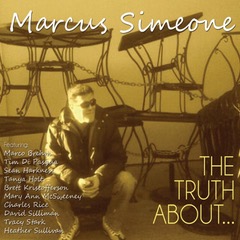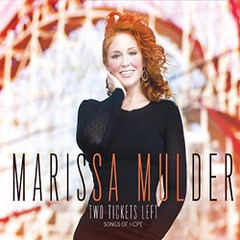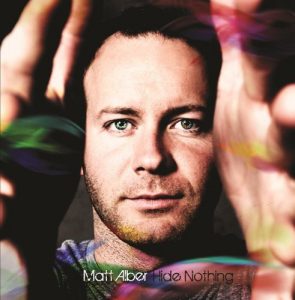Cabaret Setlist: “End of the World” — Music and lyrics by Matt Alber
Repertoire for the Once and Future American Songbook
Song #6 in this running series
Part of my intention when starting this series was to take a fresh look at songs from the American Songbook that have endured over several decades. Additionally, though, I wanted to examine newer songs, ones that would seem to have an innate power to endure but that haven’t faced the passage of time needed to test their staying power. Matt Alber’s “End of the World,” which appeared on his 2008 album Hide Nothing, is just the sort of song I had in mind.
This potent ballad, which focuses on a painful romantic breakup, makes one of the most hackneyed metaphors ever—love affair as roller coaster—seem sparklingly fresh. Listen to Matt Alber sing “End of the World” with the Cello Street Quartet.
The setting of the story-song is an amusement park. The first-person protagonist is there with a lover, but the two have been drifting apart. They decide to embark on a particularly terrifying ride. What better time for the protagonist to make a shoot-the-moon confession, a plea that will either save the affair or end it? The mood of the composition is unsettling from its very first lines:
I don’t want to ride this roller coaster.
I think I want to get off.
But they buckled me down
Like it’s the end of the world.
Indeed, amusement parks sometimes do overplay the fear factor of their rides. Alber reinforces that notion in a subsequent lyric: “We’re climbing to our death,” he writes. “At least that’s what they want you to think.” Then again, sometimes we do read about a fateful case in which a roller-coaster car will, in the songwriter’s words, “jump the track.” There is, then, a mood of real distress surrounding the metaphor here (especially for a listener like me, who has acrophobic tendencies and goes weak in the knees even thinking about climbing on anything billed as a “thrill ride”). The verse builds toward a release of tension, in an unrestrained, colloquial way. Alber avoids the element of rhyme, which makes the song seem an even more spontaneous outpouring of feeling.
The release comes in a chorus that is both a cry from the heart and an irresistible musical hook. The melody—in the first couple of measures of this refrain—seems, probably unwittingly, to echo the chorus of “A Man Without Love”—a 1966 song by Cyril Ornadel and Peter Callander, made popular by singer Engelbert Humperdinck. As for the text, Alber’s simple but perfect lyric captures the eruption of a panic attack:
I don’t wanna fall, I don’t wanna fly,
I don’t wanna be dangled over
The edge of a dying romance.
Notice the contradiction—or is it a paradox? The singer is afraid both of falling and of flying—of abandonment and commitment, despair and exhilaration. In the next line, the character also claims not to want to “stop” (the ride / the relationship).
As the second verse begins, the ride is over, but the singer continues with the appeal to save the love match. The lovers have some leftover ride tickets, which they need to use before the park closes. Should they give them away to strangers or “get back in line and ride the big one”?
The words of the second refrain change the tone of the song slightly by posing a question that can double as an invitation, maybe even a dare:
Don’t you wanna fall, don’t you wanna fly,
Don’t you wanna be dangled over
The edge of this aching romance?
If the pair are ready to cling to each other, teaming up for the thrills and challenges of the ride, maybe things won’t be so scary after all. Notice that “a dying romance” has been replaced by “this aching romance.” Alber seems to be sorting out which is preferable: the grief that comes at the end of a relationship or the pain that may result from attempting to preserve it. The last words of the song leave such a question unanswered, but a beam of hope for the couple may be in sight.
Before beginning his solo career, Kansas-born Alber was a countertenor with the men’s classical ensemble Chanticleer. He wrote “End of the World” in response to his and his boyfriend’s own dying/aching romance. The song, sadly, did not save the relationship, but it won the hearts of many a listener.” It became popular on cable TV’s gay-oriented “Logo” channel, where it was heard in a music video starring Alber himself: Watch here.
To me, the video and song seem ill-fitted to each other. Alber’s edge-of-despair amusement-park lyrics are juxtaposed with imagery from a much happier-concluding tale, set not in—say—Coney Island, but rather, a vintage barber shop. This pileup of metaphors, however, did not curb the song’s growing popularity. “End of the World” became Alber’s’s signature number, and you can hear various versions of him singing it online. It has even been retooled (by producer Morgan Page) as a dance mix: Put on your hustle shoes for this version.
I began to hear “End of the World” in New York cabaret clubs less than a decade ago. In my Bistro Awards review of David Ballard’s 2013 show Having It All, directed by Tanya Moberly, I wrote that Ballard’s performance of the song was the highlight of the evening: “Its amusement park imagery is sharp and rich, and Ballard sings it with emotional depth.”
Others were also becoming aware of the song during this period. Stephen Holden of the New York Times singled it out in a review of the late Baby Jane Dexter’s 2012 show at the Metropolitan Room. Then, in a 2014 review of Alber’s performance as part of Lincoln Center’s American Songbook series, Holden cited Alber’s song as “one of the most wrenching ballads to be heard in years.”
 After hearing Dexter’s take, Marcus Simeone performed it in a show and on his 2014 CD The Truth About…. “I loved it, because, to me, it encompassed all of those feelings one goes through when they are in a conflicted relationship.” Hear Marcus Simeone sing “End of the World.”
After hearing Dexter’s take, Marcus Simeone performed it in a show and on his 2014 CD The Truth About…. “I loved it, because, to me, it encompassed all of those feelings one goes through when they are in a conflicted relationship.” Hear Marcus Simeone sing “End of the World.”
Simeone didn’t spend time studying Alber’s version, as he felt the songwriter’s performance didn’t do justice to the song itself. He believed Alber the vocalist had focused too intently on the musical elements in the song and not sufficiently on the tale being told: “He didn’t articulate and tell the story that I wanted to tell.”
But Simeone found the story itself to be powerful:
“The movement of the narrative was partly what attracted me to the song. I think it’s the kind of song where the listener starts to think or feel “Ohhhh,” and if they have any heart at all, or have been in love, they start to feel the intensity of it. The narrative builds and unfolds, as should the performance itself.”
One thing that’s needed to successfully sing “End of the World,” says Simeone, is an ability to make dramatic adjustments in volume—quickly and smoothly executing pianissimo-to-forte transitions. “That’s the kind of thing, physically, you either have or you don’t. And if you don’t, you’d better find your way around that and do your best acting possible.”
He remembers when he, director Lina Koutrakos, and musical director Tracy Stark first explored the number together. Stark sight-read the music, following his lead. “A few seconds after we were done and the dust settled, Lina came over to me and said, ‘What the hell was that? Oh, my God—it’s gorgeous.’”
 Just as Simeone had been inspired by Baby Jane Dexter, so Marissa Mulder became enthusiastic about the song after hearing Simeone perform it at the Metropolitan Room. “I joked with him that I stole it from him,” she says. (Simeone’s show also prompted her to sing John Prine’s “Hello in There.”)
Just as Simeone had been inspired by Baby Jane Dexter, so Marissa Mulder became enthusiastic about the song after hearing Simeone perform it at the Metropolitan Room. “I joked with him that I stole it from him,” she says. (Simeone’s show also prompted her to sing John Prine’s “Hello in There.”)
“Of all the songs I heard in Marcus’s set, [“End of the World”] just grabbed me. It gave me chills and made me cry. I related to it. So, when I went home and found it, I did listen to Matt Alber’s version a bunch and was just so in awe of it and wondered how I’d never heard of it before….”
She appreciated the original rendition more than Simeone did. But, as she prepared her own interpretation, she decided that listening repeatedly to Alber’s version was not necessary. Calling the song “a perfect marriage of music and lyrics,” she claims that the melody “feels like a wave to me—it keeps rising and falling, building and releasing.” And, of course, she adds, that pattern matched the roller-coaster imagery of the lyrics. Here’s Marissa Mulder’s interpretation of the song.
Mulder sang the number in her 2014 show Living Standards, directed and produced by Tom Toce, who supported her in her interpretive choices. Musical director Nate Bucccieri also gave valuable assistance: “When I first brought it to him, I don’t believe he had heard it yet, and he was mesmerized by it and so connected to it also. He played it just right and always followed me, allowing me to breathe and express the song exactly as I felt it, and in my own time.”
Lina Koutrakos, who is a personal friend of Mulder’s, sat in on one rehearsal and provided additional feedback. “Lina…loved the song and said, ‘It works so well on you.’ She would just take it phrase by phrase and say, ‘This line is really coming through, but this other one can be stronger.’”
Later, Mulder’s rendition of the song appeared on her album Two Tickets Left (the title of which references Alber’s lyric about the leftover amusement-park passes).
Mulder notes that several singers who have seen her YouTube performance” have written to inquire about the sheet music. I ask her why “End of the World” isn’t better known by the general public.
“Maybe the song hasn’t had its moment,” she suggests. “Maybe it’s waiting for the right singer to discover it. I’ve been blown away by the response I’ve gotten to it. I’ve gotten comments on YouTube from people around the globe… That’s the power of a good song…. And it’s a good reminder to myself that, as a singer, if you hear a song that makes you sit up at the edge of your chair wondering ‘What is that…?’ then you’ve got to sing it!”
I could imagine the song performed by a variety of different singers, taking diverse approaches. It might work especially well if delivered with a touch of twang by a performer such as Dolly Parton or even Willie Nelson. (Alber has joked in the past that he cannot be a country singer because he’s gay; on the other hand, Nashville seems to have become more open to LGBTQ artists and artistry of late.)
For now, it’s nice to know that “End of the World” has become a favorite in our own little corner of the musical world. There is something to be said for hidden treasures.
In closing, I should note that Matt Alber is by no means a one-song wonder. Here’s another title of his that you may want to know: “Velvet Goldmine.”
About the Author
Mark Dundas Wood is an arts/entertainment journalist and dramaturg. He began writing reviews for BistroAwards.com in 2011. More recently he has contributed "Cabaret Setlist" articles about cabaret repertoire. Other reviews and articles have appeared in theaterscene.net and clydefitchreport.com, as well as in American Theatre and Back Stage. As a dramaturg, he has worked with New Professional Theatre and the New York Musical Theatre Festival. He is currently literary manager for Broad Horizons Theatre Company.






I have long been a fan of End of the World and Matt Alber… It’s one of those rare songs that grabbed me from first listening, which was then amplified and deepened with the release of the video. Truthfully, I’m an older gay man whose never really been deeply in love (make of that what you will), yet this song speaks to my heart… no, my soul… whatever is the deepest part of us. I’ve listened to it more than a hundred times, conservatively. Sometimes I cry, sometimes in heaving sobs, while other times I just smile. Contentedly. I hope someday to meet Mr. Alber and thank him, although he’s heard it all before, I’m sure. (I just hope he never tires of knowing how much I’ve loved his song.)